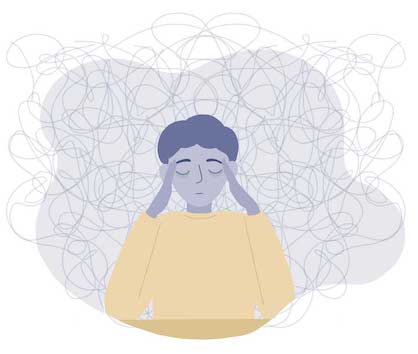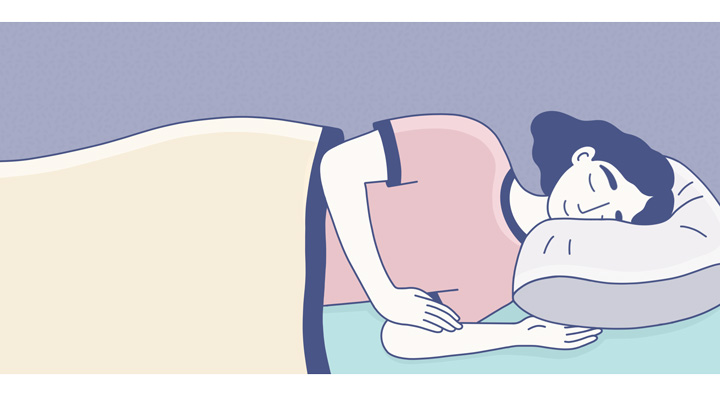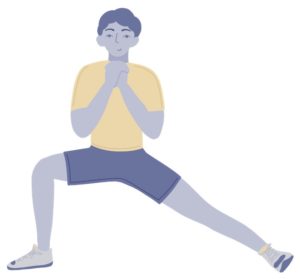If you weren’t already familiar with grief before 2020, you probably are now. In the wake of Covid-19, so many of us lost loved ones, jobs, homes, incomes, and plans for major life events such as weddings and vacations.
Grief is the emotional pain that we experience in the face of loss, and it’s perfectly normal. Many people undergo a mixture of physical and mental symptoms while grieving. There’s no “right” way to experience grief, and the process is different for everyone.
“Everyone grieves differently no matter their age,” says Lisa Keys, a retired Physician Association and creator of the grief blog Good Grief Cook.
One thing many grieving people have in common? Trouble sleeping. Grief can impact sleep in several ways, and your sleep quality (or lack thereof) can also impact the grieving process. Let’s take a closer look at the relationship between sleep and grief—plus strategies for sleeping better after a loss.
Relationship Between Sleep and Grief
Grief might arise in many circumstances including the loss of a loved one, divorce, loss of health, job loss, miscarriage, retirement, loss of safety after a traumatic incident, selling a family home, loss of a pet, loss of a deeply held dream, and more.
No matter the source of grief, it could make it harder to sleep well. Here’s how grief can impact sleep—and vice versa.
Grief and Sleep Loss
Many people find that grief makes it harder to obtain high-quality sleep.
For instance, a 2008 research review, which was published in Psychiatric Annals, found that people suffering from the loss of a spouse late in life were likely to suffer from impaired sleep. That same study found the more severe the grief, the greater the sleep impairment. The most serious symptoms usually arose in people suffering from complicated grief.
The Mayo Clinic defines complicated grief, or persistent complex bereavement disorder, as long-lasting and severe grief in which a person struggles to process their loss and live their regular life. One study suggests approximately 10% of grieving people will experience complicated grief.
A 2017 study published in Behavioral Sleep Medicine found that complicated grief was associated with shorter sleep duration and lower sleep quality overall. The researchers attributed this poor sleep quality to depressive symptoms. Similarly, a 2018 study found that individuals experiencing complicated grief tend to sleep too little and/or have trouble falling asleep.
In addition to depression, grieving individuals might suffer from a form of Post-Traumatic Stress Disorder (PTSD). According to a 2016 review published in PTSD Research Quarterly, insomnia is a very common symptom of PTSD. Some people with PTSD also experience nightmares, which can disrupt sleep and cause nighttime wake-ups.
The effects of grief on sleep might vary from night to night. “Sometimes you will be able to sleep soundly as the grief shuts you down and you comfortably drift off, and other times it hits just as your body relaxes and keeps you up all night,” says mindset kinesiology expert Belinda Ginter.
The Effect of Sleep Loss while Grieving
Just as grief can inhibit sleep, poor sleep can actually provoke worse grief.
A 2021 study conducted at the University of Arizona found that people who experienced chronic sleep issues prior to a loss were more likely to develop complicated grief afterward. Even people who don’t experience complicated grief may find that sleep disturbances worsen their experience while grieving.
Why does poor sleep have such a big impact? The University of Arizona researchers posited that it’s because during sleep, our minds process emotional events and our bodies recover from stress. Without quality sleep, a person’s mind and body can’t restore themselves as effectively.
Keys concurs. “Getting a good night’s sleep provides the energy to not only live through the pain of grief, but also to heal it,” she says. “Without the energy derived from a good night’s rest sleep, the bereavement journey is at risk.”
Poor sleep also increases the risk of developing depression, anxiety, and other mental health issues. This can cause added strain for a person who’s already struggling with grief.
Symptoms of Grief
Grief often manifests in a variety of mental and physical symptoms, many of which might complicate a person’s ability to obtain a good night’s rest. “Grief assaults both the body and the mind,” says Keys. “There can be physical pain as well as mental pain like anxiety, guilt, and loneliness.”
Let’s take a closer look at these symptoms and their relationship to sleep.
Mental Health and Grief
Here’s a quick overview of some of the mental health symptoms of grief.
Anxiety
Feeling anxious after a loss is normal, says J.F. Benoist, a therapist, author of Addicted to the Monkey Mind, and founder of the treatment center The Exclusive Hawaii. People may worry that “you’ll never have that connection or love again, or that more loss is going to happen to you.”
According to the Anxiety & Depression Association of America, anxiety and stress can provoke sleep problems and/or worsen existing sleep problems. Issues might include trouble falling asleep, difficulty staying asleep, waking up too early, and/or waking up feeling unrested.
Depression
Depression is another common symptom of grief, and it too can make it harder to sleep well. A 2008 study found strong links between depression and sleep issues. The researchers reported that nearly three-quarters of depressed people suffer from insomnia.
Feelings of Isolation
Many grieving people withdraw from friends and family while processing their loss, which can provoke a sense of isolation. Similarly, many people feel that it’s hard for non-grieving people to understand their loss. Feeling isolated can cause stress, which may interfere with sleep.
Intense Emotions
It’s common to experience intense emotions while grieving. In many cases, these feelings may change form and come in waves.
“Many people don’t realize that grief is often unprocessed anger,” Benoist says. “While there is an experience of loss… underneath that loss is anger about the loss. This anger usually isn’t getting addressed, which ends up creating anxiety. … Ultimately, this anxiety is what’s making it hard for you to sleep.”
Physical Symptoms of Grief
As Keys noted, grief symptoms can show up in the body as well as the mind. Some of the physical symptoms of grief include:
- Body aches
- Headaches
- Stomach pains
- Loss of appetite
- Cardiac issues
- Exhaustion
No matter the location of aches and pains, ample research suggests pain can inhibit sleep quality. In a vicious cycle, poor-quality sleep can exacerbate pain symptoms.
How to Sleep Better while Grieving
If you’re struggling with sleep issues during the grieving process, know that help is available—and in many cases, all it takes to sleep better is a little self-care. Here are several strategies for sleeping better while grieving.
Start a Sleep Journal
Consistently tracking your sleep routines and sleep quality can help you spot patterns and identify habits that might not be serving you. This information will also be helpful if you seek support from a medical professional.
Dedicate Time for Emotional Processing During the Day
Take time each day to journal or sit with your emotions, even if it’s just for a few minutes. This can help you release feelings that might otherwise crop up when you climb into bed.
“When we settle our bodies at the end of the night, it can signal our minds to start running,” Ginter says. “When our minds get away from us it can bring forth memories [and] questions and trigger us to start reliving past experiences. This is all normal if we have not taken time during our days… to process and allow our memories a time to flow naturally.”
Meditate Before Bed
To sleep well, Benoist says, “You need to relax your nervous system and remind yourself that grieving is like the weather—your emotions are ever changing, and they always end up passing through.”
One way to do this is through meditation. Benoist says just focusing on your breathing for 10 minutes before bed could help.
Seek Social Support
“Communication of normal grief responses needs to be supported,” Keys says. Seek out friends and family members whom you trust to listen without judgement and make space for your feelings.
Adopt a Morning and Evening Stretch Routine
Much like meditation, stretching, gentle yoga, qigong, or tai chi are all effective tools for getting back into your body and reducing anxiety. Adopting morning and evening routines creates a grounding container for your days.
Eat Well and Exercise
Keys suggests “eliminating substances that may cause sleep problems, like caffeine, alcohol, and other drugs” from your diet. She’s also a big proponent of exercise, which can relieve stress. “It helps release tension, anxiety, and aggression as well as keeping the body in good physical condition,” she says. Research suggests regular exercise can also make it easier to sleep at night.
Create a Peaceful Sleep Environment
A comfortable, calming sleep space will increase your chances of drifting off to sleep. Practice good sleep hygiene by keeping your bedroom cool, dark, and quiet. Keep electronics out of the bedroom, as their blue light can disrupt circadian rhythms, and reserve the bed for sex and sleep.
It’s also important to invest in a comfortable mattress and bedding. For instance, if you’re prone to sleeping hot, a cooling mattress and breathable sheets will protect against waking up in the night all covered in sweat. It can be hard to fall back asleep after a nighttime wake-up when you’re grieving, so do everything in your power to help your body sleep soundly through the night.
Additional Treatments for Sleep Loss and Grief
If the above tips haven’t helped, it might be time to try more robust strategies. Here are a few proven options.
- Cognitive-Behavioral Therapy. The 2008 review cited earlier found that Cognitive-Behavioral Therapy can be especially helpful for combating insomnia. When it comes to sleep, this sleep treatment involves a variety of techniques such as adopting good sleep hygiene, creating a soothing sleep environment, and reframing your thoughts about sleep.
- Bereavement counseling. Many therapists specialize in caring for patients who are experiencing grief. This kind of specialized counseling can help you process emotions and develop effective coping skills so you’re less likely to feel consumed by heightened emotions before bed.
Sleep clinics. If you’re dealing with ongoing sleep issues, it might be helpful to consult a sleep clinic. They’ll conduct tests to help you get to the bottom of your sleep challenges and identify potential treatments.
Final Thoughts
Grief will affect virtually everyone at some point. While the experience varies from person to person, many grieving people suffer from insomnia or other sleep issues.
If you’re struggling to sleep while grieving, know that you’re not alone. The good news is there are plenty of self-care strategies that can increase your chances of obtaining quality sleep.
If all else fails, it’s a good idea to consult a medical and/or mental health professional to guide you toward effective solutions. By getting more sleep, you’ll help your mind and body recover from grief.




